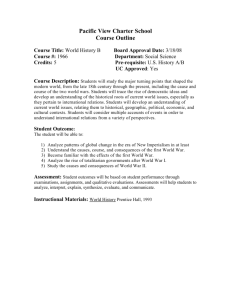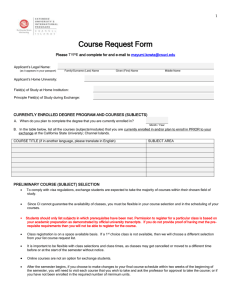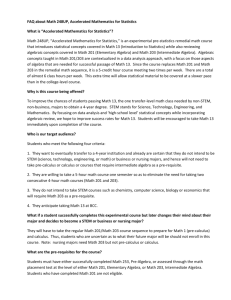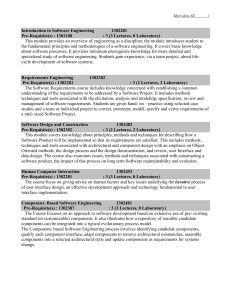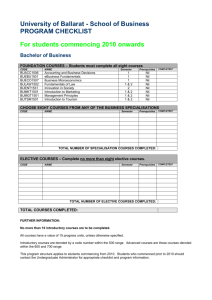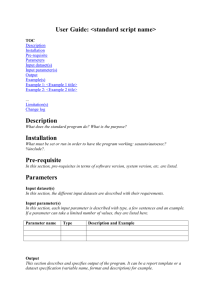NTU Education (BRC) Course Listing
advertisement
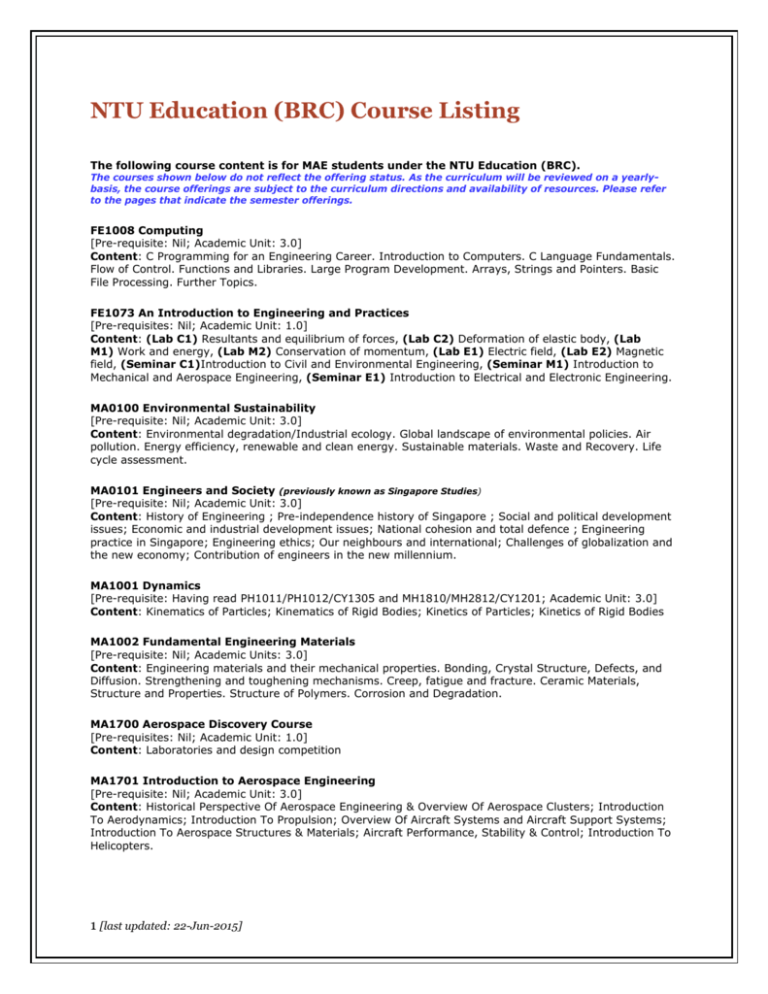
NTU Education (BRC) Course Listing The following course content is for MAE students under the NTU Education (BRC). The courses shown below do not reflect the offering status. As the curriculum will be reviewed on a yearlybasis, the course offerings are subject to the curriculum directions and availability of resources. Please refer to the pages that indicate the semester offerings. FE1008 Computing [Pre-requisite: Nil; Academic Unit: 3.0] Content: C Programming for an Engineering Career. Introduction to Computers. C Language Fundamentals. Flow of Control. Functions and Libraries. Large Program Development. Arrays, Strings and Pointers. Basic File Processing. Further Topics. FE1073 An Introduction to Engineering and Practices [Pre-requisites: Nil; Academic Unit: 1.0] Content: (Lab C1) Resultants and equilibrium of forces, (Lab C2) Deformation of elastic body, (Lab M1) Work and energy, (Lab M2) Conservation of momentum, (Lab E1) Electric field, (Lab E2) Magnetic field, (Seminar C1)Introduction to Civil and Environmental Engineering, (Seminar M1) Introduction to Mechanical and Aerospace Engineering, (Seminar E1) Introduction to Electrical and Electronic Engineering. MA0100 Environmental Sustainability [Pre-requisite: Nil; Academic Unit: 3.0] Content: Environmental degradation/Industrial ecology. Global landscape of environmental policies. Air pollution. Energy efficiency, renewable and clean energy. Sustainable materials. Waste and Recovery. Life cycle assessment. MA0101 Engineers and Society (previously known as Singapore Studies) [Pre-requisite: Nil; Academic Unit: 3.0] Content: History of Engineering ; Pre-independence history of Singapore ; Social and political development issues; Economic and industrial development issues; National cohesion and total defence ; Engineering practice in Singapore; Engineering ethics; Our neighbours and international; Challenges of globalization and the new economy; Contribution of engineers in the new millennium. MA1001 Dynamics [Pre-requisite: Having read PH1011/PH1012/CY1305 and MH1810/MH2812/CY1201; Academic Unit: 3.0] Content: Kinematics of Particles; Kinematics of Rigid Bodies; Kinetics of Particles; Kinetics of Rigid Bodies MA1002 Fundamental Engineering Materials [Pre-requisite: Nil; Academic Units: 3.0] Content: Engineering materials and their mechanical properties. Bonding, Crystal Structure, Defects, and Diffusion. Strengthening and toughening mechanisms. Creep, fatigue and fracture. Ceramic Materials, Structure and Properties. Structure of Polymers. Corrosion and Degradation. MA1700 Aerospace Discovery Course [Pre-requisites: Nil; Academic Unit: 1.0] Content: Laboratories and design competition MA1701 Introduction to Aerospace Engineering [Pre-requisite: Nil; Academic Unit: 3.0] Content: Historical Perspective Of Aerospace Engineering & Overview Of Aerospace Clusters; Introduction To Aerodynamics; Introduction To Propulsion; Overview Of Aircraft Systems and Aircraft Support Systems; Introduction To Aerospace Structures & Materials; Aircraft Performance, Stability & Control; Introduction To Helicopters. 1 [last updated: 22-Jun-2015] MA2001 Mechanics of Materials [Pre-requisite: Nil; Academic Unit: 3.0] Content: Review, Stress And Strain, Torsion, Shearing Stress in Beams, Transformation of Stress and Strain, Deflection of Beams, Columns. MA2002 Theory of Mechanism [Pre-requisite: MA1001; Academic Unit: 3.0] Content: Fundamental Concepts of Mechanisms, Gears and Gear Train, Motion in Mechanisms: Kinematic Analysis, Motion in Mechanisms: Static-Force Analysis, Motion in Mechanisms: Dynamic-Force Analysis, Design and Analysis of Cam-and-Follower Systems. MA2003 Introduction to Thermo-fluids [Lectures: 26 hrs; Tutorials: 13 hrs; Pre-requisite: Nil; Academic Unit: 3.0] Content: Properties of pure substances. Work and heat. Energy and the first law. Energy balance for closed systems and steady state control volumes. Submerged surfaces and bodies. Elementary fluid dynamics. MA2004 Manufacturing Processes [Pre-requisite: Nil; Academic Units: 3.0] Content: Introduction and overview of manufacturing. Dimensions and surfaces measurement. Casting. Shaping processes for polymers. Sheet metalworking. Materials removal processes. Joining processes. Microelectronics manufacturing. MA2005 Engineering Graphics [Pre-requisite: Nil; Academic Unit: 3.0] Content: Orthographic projections; Pictorial views and technical sketching; Drawing standards and practices; Sectional views and machine drawings; Development of surfaces; Dimensioning standards, systems and conventions; Dimensioning features and finishes; Tolerance dimensioning and limits; Geometric dimensioning. MA2006 Engineering Mathematics [Pre-requisite: FE1006/MH1810 and FE1007/MH1811 or CY1201 and CY1203 or MA1003/MH2812; Academic Unit: 3.0] Content: Linear algebra, vector calculus, Laplace transformation and Fourier analysis. MA2007 Thermodynamics [Pre-requisite: MA2003; Academic Unit: 3.0] Content: Second law and entropy. Entropy balance for closed systems and steady state control volumes. Ideal gas mixtures and psychrometrics. Thermodynamic cycles for power plants and refrigeration systems. Reacting mixtures and combustion. MA2008 Experimental Methods for Engineers [no longer offering] [Pre requisite: Nil; Academic Unit: 1.0] Content: Introduction to experiments, Basic statistic knowledge including regression analysis and hypothesis testing, Introduction to measurement instruments, Error Propagation analysis, Signal Conditioning. MA2009 Introduction to Electrical Circuits & Electronics Devices [Pre requisite: Nil; Academic Unit: 3.0] Content: Analysis of Resistive Linear Networks, Energy Storage Elements and Transient Analysis, AC network analysis, Operational Amplifiers and applications, Basic semiconductor devices and applications, Logic Circuits MA2011 Mechatronics System Interfacing (Mechatronics Stream only) [Pre-requisite: Nil; Academic Unit: 3.0] Content: Measurement system behaviour. Analog devices and measurement. Digital devices and measurement. Sensors. Actuators. Drives for motion control. 2 [last updated: 22-Jun-2015] MA2012 Introduction to Mechatronics Systems Design (Mechatronics Stream only) [Pre-requisite: Nil; Academic Unit: 3] Content: Introduction to Mechatronics system, Embedded Systems, Interfacing to actuators & sensors, Interfacing to input and output devices, Introduction to web tools. Students are required to complete a group project where they are to design, fabricate and demonstrate your product to the class. MA2013 Creative Thinking and Design (Design Stream only) [Pre-requisite: Nil; Academic Unit: 3.0] Content: Fundamental Design, Design Methods, Creative Thinking MA2014 Product Presentation (Design Stream only) [Pre-requisite: Nil; Academic Unit: 3.0] Content: Presentation Techniques, Model-Making Methods MA2071 Laboratory Experiments (ME) [Pre-requisite: Nil; Academic Unit: 1.0] Content: Consists of 10 experiments related to Year 2 MAE core courses. MA2072 Laboratory Experiments (AE) [Pre-requisite: Nil; Academic Unit: 1.0] Content: Consists of 10 experiments related to Year 2 MAE core courses. MA2079 Engineering Innovation and Design [Pre-requisite: Nil; Academic Unit: 2.0 ] Content: Introduction to Business planning, and Project management; Practice in generating ideas and creative products, and technology and innovative engineering solutions through i-Project. MA2700 Aerospace Materials and Manufacturing Processes [Pre requisite: Nil; Academic Units: 3.0] Content: Introduction to Aerospace Materials, Atomic Structures, Crystal Structures, Crystal Defects, Mechanical Properties, Strengthening Mechanisms, Failures of Aerospace Materials, Phase Diagrams, Special Aerospace Materials, Composites, Non-Destructive Evaluation, Manufacturing Processes, Machining, Joining and Finishing Processes. MA2701 Flight Performance [Pre-requisite: MA1001 and MA1700; Academic Unit: 2.0] Content: Introduction to flight environment. Aerodynamics of the airplane. Basic propulsion characteristics. Aircraft point-mass equations of motion. Steady cruise & climb performance. Range and endurance. Maneuver performance. Takeoff and landing. Energy methods. MA3001 Machine Element Design [Pre-requisite: Having read MA2001 and MA2002; Academic Unit: 3.0] Content: Power transmission components. Dimensioning and tolerancing according to ISO standards, surface finish. Bearings. Threaded fasteners, power screw, Design of load carrying joints. Designing against fatigue loading and wear. Design of machine structures. MA3002 Solid Mechanics and Vibration [Pre-requisite: MA2001; Academic Unit: 3.0] Content: Energy Method of Analysis. Fracture Mechanics. Fatigue. Vibrations for Single-Degree-of-Freedom System. Vibrations for Two-Degree-of-Freedom System. MA3003 Heat Transfer [Pre-requisite: MA2007; Academic Unit: 3.0] Content: Conduction, Convection, Heat Exchangers, Radiation Heat Transfer. 3 [last updated: 22-Jun-2015] MA3004 Mathematical Methods in Engineering [Pre-requisite: MH1810 and MH1811 or CY1203 or MH2812; Academic Unit: 3.0] Content: Partial Differential Equations (PDEs). Finite Element Method (FEM). Computational Fluid Dynamics (CFD). MA3005 Control Theory [Pre-requisite: Having read MA2006; Academic Unit: 3.0] Content: Introduction and Revision of Laplace Transform, System Responses - transient and steady, PID Controls, Root Locus Technique, Frequency Response Methods. MA3006 Fluid Mechanics [Pre-requisite: MA2003; Academic Unit: 3.0] Content: Momentum equation and its applications. Dimensional analysis and similitude. Internal flows and piping systems. Principles and applications of fluid machines. MA3010 Thermodynamics & Heat Transfer [Pre-requisite: MA2003; Academic Unit: 3.0] Content: Second law and entropy. Entropy balance for closed systems and steady state control volumes. Ideal gas mixtures and psychrometrics. Heat transfer: conduction, convection and radiation.. MA3071 Engineering Experiments (ME) [Academic Unit: 1.0] Content: Consists of projects and experiments related to Year 3 MAE core courses. MA3072 Engineering Experiments (AE) [Academic Unit: 1.0] Content: Consists of projects and experiments related to Year 3 MAE core courses. MA3700 Aircraft Structures I [Pre-requisites: MA2001; Academic Unit: 3.0] Content: Structural components of an aircraft. Loads on aircraft. Aircraft structural components and structural idealization. Open and closed thin walled tubes. Multicell structures. Axial constraint. Practical aircraft structural analysis. MA3701 Aerodynamics [Pre-requisite: Nil; Academic Unit: 3.0] Content: Introduction, fundamental principles, potential flows, incompressible flows over airfoils, finite wings, fundamentals of gas dynamics, shocks, subsonic compressible flow, transonic flows, linearized supersonic flows. MA3702 Aircraft Propulsion [Pre-requisite: MA2007; Academic Unit: 3.0] Content: Essentials of Thermodynamics, Fundamentals of Aircraft Propulsion, Propulsion Engines and Performance Analysis, Combustor and Combustion, Introduction to Rocket Propulsion. MA3703 Flight Dynamics [Pre-requisite: MA2701 and MA3705; Academic Unit: 2.0] Content: Introduction. Static stability and control. Six degree-of-freedom aircraft flight modeling. Linearization and linear system theory. Linearized aircraft equations of motion. Longitudinal and lateraldirectional dynamics. Introduction to aircraft control. MA3704 Aircraft Electrical Devices [Pre-requisite: Nil; Academic Unit: 3.0] Content: Aircraft electrical power systems, Electromagnetic principles and actuators, Electrical transformers, Electrical rotating machines. 4 [last updated: 22-Jun-2015] MA3705 Aerospace Control Theory [Pre-requisite: Having read MA2006; Academic Unit: 3.0] Content: Introduction. Dynamic system modeling. Dynamic response characteristics. Aircraft dynamic characteristics. Feedback control systems. Root locus techniques. Frequency-domain analysis and design. Application in flight control systems. MA4001 Engineering Design (Mainstream only) [Pre-requisite: Having read MA3001; Academic Unit: 4.0] Content: Product Definition; Conceptual Design; Embodiment Design; Detailed Design and Engineering Analysis And Documentation; Mechanical Power Transmission Systems; Hydraulic And Pneumatic Systems; Electric Motors And Linear Motion Systems; Programmable Logic Control (PLC) techniques. Review of basic engineering materials properties and failure modes; Basics materials selection in design; Effect of component geometry in materials selection; Compound objectives and multiple constraint problems; Cost estimation tools. MA4002 Fluid Dynamics [Pre-requisite: MA3006; Academic Unit: 3.0] Content: General equations of motion. Potential flow. Isentropic compressible flow. Normal shock waves, Fanno and Rayleigh line flows. Boundary layer flow. External flow. Performance characteristics of pumps and turbines. Unsteady flow. MA4011 Engineering Product Design (Design Stream only) [Pre-requisite: Having read MA3001; Academic Unit: 4.0] Content: Product definition; Conceptual design; Embodiment design; Detailed design and engineering analysis and documentation; Mechanical power transmission systems; Hydraulic and pneumatic systems; Electric motors and linear motion systems; Programmable logic control (PLC) techniques. Review of basic engineering materials properties and failure modes; Basics materials selection in design; Effect of component geometry in materials selection; Compound objectives and multiple constraint problems; Cost estimation tools. MA4012 Mechatronics Engineering Design (Mechatronics Stream only) [Pre-requisite: Having read MA3001; Academic Unit: 4.0] Content: Product definition; Conceptual design; Embodiment design; Detailed design and engineering analysis and documentation; Mechanical power transmission systems; Hydraulic and pneumatic systems; Electric motors and linear motion systems; Programmable logic control (PLC) techniques. Review of basic engineering materials properties and failure modes; Basics materials selection in design; Effect of component geometry in materials selection; Compound objectives and multiple constraint problems; Cost estimation tools. MA4701 Aircraft Design [Pre-requisites: MA3701, MA3702, and MA3703, Academic Units: 3.0] Content: Introduction and Overview of the Aircraft Design Process. Initial Design Estimates and Configuration Layout. Review (Aerodynamics, Aerostructures, Aircraft Performance and Flight Mechanics). Propulsion and Fuel System Integration. Aircraft Systems Integration. Airworthiness, Certification and Environmental Considerations. Cost Analysis. Case Studies. Invited Lectures. MA4702 Aircraft Structures II [Pre-requisites: MA2001, MA3700, and MA3701; Academic Unit: 3.0] Content: Fundamentals Of Vibration, Vibration Of Single Degree Of Freedom Systems, Vibration Of Multiple Degrees Of Freedom Systems, Vibration Of Continuous Systems, Vibration Measurement And Control. FEM. MA4704 Aeroelasticity [Pre-requisite: MA3700 and MA3701; Academic Unit: 3.0] Content: Introduction to Aeroelasticity, Review of Structural Dynamics, Static Aeroelasticity, Unsteady Aerodynamics, Flutter. 5 [last updated: 22-Jun-2015] MA4705 Aircraft Navigation and Flight Computers [Pre-requisite: MH1811/CY1203/MH2812; Academic Unit: 3.0] Content: Introduction to Signal and Processes; Radio and Inertial Navigation; Basics of Navigation Data Processing; Fundamental and Trend of Flight Computers and Flight Control Systems. MA4800 Biomechanics [Pre-requisites: MA2001, Academic Unit: 3.0] Content: Introduction; Loads and Motion; Bone Biomechanics; Soft Tissue Biomechanics; Structural Analysis: Beam Theory; Advanced Structural Analysis; Bone-Implant Systems. MA4801 Finite Element Method [Pre-requisite: MA3004; Academic Unit: 3.0] Content: Formulation of spring element, bar element, truss element, beam element, plane stress and plane strain elements, axisymmetric element; Different methods to finite element formulation: direct stiffness approach, total potential energy approach, and weighted residual approach; Formulation of isoparametric elements; Applications to solid mechanics, heat transfer and vibration problems; Practical aspects of finite element analysis and hands-on sessions. MA4802 Engineering Acoustics [Pre-requisite: Nil; Academic Unit: 3] Content: Fundamental concepts of sound waves and plate vibrations. The wave equation and its solutions in fluids. Reflections, transmissions and standing waves. Sound sources, generation and radiation. Sound in ducts. Measurement and analysis of sounds and vibrations. MA4803 Noise and Vibration Control [Pre-requisite: Nil; Academic Unit: 3.0] Content: Fundamentals of Vibration; Measurement of Vibration; Design for Vibration Control; OneDimentional Acoustic Waves; Acoustic Transmission Phenomenon; Sound in Enclosed Space; Sound Propagation Outdoors; Human Response to Noise and Measurement of Noise. MA4804 Optimisation Theory and Applications [Pre-requisite: MH1810; Academic Unit: 3.0] Content: Introduction and Overview; Fundamental Concepts in Optimization; Categorization of Optimization Problems and Methods; Non-Linear Programming; Linear Programming; Discrete Optimization; Software Tools; Multi-Objective Optimization. MA4805 Mechanics of Microsystems [Pre-requisite: Nil; Academic Unit: 3.0] Content: Stiffness basics; Microcantilevers, microhingers, microbridges; Microsuspensions; Microtransduction: actuation and sensing; Static response of Microsystems; Dynamic response of Microsystems. MA4806 Micro Electro Mechanical Systems [Pre-requisite: Nil; Academic Unit: 3.0] Content: Overview of MEMS; Working principles of MEMS; Scaling laws in miniaturization; Materials for MEMS; MEMS fabrication processes; Overview of micromachining; MEMS design; Assembly, packaging, and testing of MEMS. MA4807 Marine Structural Integrity [Pre-requisite: MA2001; Academic Unit: 3.0] Content: Loads and its effect on Marine structures. Analysis of Marine structures. Fatigue and fracture analysis in Marine engineering systems component. Failure analysis in Marine engineering systems component . Structural integrity design of welded structures. Structural integrity design of Offshore structures. MA4808 Marine Control Systems [Pre requisite: Nil; Academic Unit: 3.0] Content: This course introduces Electrical Machines and Electrical Power Systems, Fluid Power Control, Pumps and Piping Systems, Automation & Control in Marine Engineering Systems. 6 [last updated: 22-Jun-2015] MA4809 Ship Design [Pre-requisite: MA2001; Academic Unit: 3.0] Content: Ship Hull Strength and Structural Analysis, Mechanics of Marine Vehicles, Ship resistance & Propulsion, Ship Dynamics. MA4810 Marine Power and Propulsion [Pre-requisite: MA2007 and MA2001; Academic Unit: 3.0] Content: Power & Propulsion Systems, Mechanical Power Transmission, Electrical Power Systems. MA4811 Psychrometry and Air Conditioning [Pre-requisite: MA3003; Academic Unit: 3.0] Content: Air-conditioning systems and applications. Psychrometrics, comfort and health. Heat transmission in building structures, heat gains, and cooling load calculations. Cooling equipment. Chilled water distribution systems. Air distribution systems. Cooling systems design sizing and energy calculations. Computer-aided load sizing of air-conditioning system. MA4812 Environmental Pollution Control [Pre-requisite: Nil; Academic Unit: 3.0] Content: This course will introduce the impacts of human activities on the environment as well as the concept of environmentally sustainable development and risk analysis. Essential topics of atmospheric pollution including the source and characteristics of key atmospheric pollutants, causes and effects of several major environmental issues including acid rain, photochemical smog, ozone depletion and greenhouse effect will be covered. Fundamentals of meteorology and atmospheric pollutant dispersion models will be covered in detail. Topics on atmospheric pollution control and working principles of abatement technologies form another major component of this course. Students will also be exposed to environmental issues related to water pollution and working principles of treatment technologies. MA4813 Building Services Engineering [Pre-requisites: MA3003; Academic Unit: 3.0] Content: A strong emphasis is placed on the study of fire in buildings as it is recognised that fire in buiildings claims the lives of around 10-20 people per million of population each year and its total cost could amount to 1% of a nation's GDP. This course will cover the principles of enclosure fire dynamics, its applications to building fire and smoke analysis and basic design methods for fire-fighting systems. Similarly a modern high-rise building will need efficient vertical transportation, a safe potable water supply, and hygenic waste water disposal system. As such the concept of statistical analysis of demand and cost effective systems design applied to piped services and vertical transportation systems are covered. MA4814 Computational Fluid Dynamics [Pre-requisites: MA3006 and MH1811/CY1203/MH2812; Academic Units: 3.0] Content: Introduction to computational fluid dynamics. Basic concepts of discretization. Numerical solution of model flow equations. Complex geometries and mesh generation. Turbulence models. Invited Industrial Application Seminar. Computational fluid dynamics laboratory experiments. MA4815 Fluid Machines [Pre-requisite: MA3006; Academic Unit: 3.0] Content: Introduction and Principles of Scaling Laws. Fundamental principles. Axial-flow compressors and fans. Centrifugal Compressors and Fans. Gas turbines. Hydraulic Pumps. Hydraulic turbines. MA4816 Heat and Mass Transfer [Pre-requisites: MA3003; Academic Unit: 3.0] Content: A comprehensive knowledge of heat transfer is essential to the training of a mechanical engineer in our knowledge-based economy. As an advanced second course on the subject, it covers the essential topics of heat transfer not covered in the earlier core course, viz., multi-dimensional and unsteady heat conduction, boundary layer theory in convection, boiling and condensation, mass transfer, and numerical methods. 7 [last updated: 22-Jun-2015] MA4817 Heat Exchangers [Pre-requisites: MA3003; Academic Unit: 3.0] Content: As an elective course, it covers the basic principles and methodologies of heat exchanger design and rating, and provides comprehensive treatment of common heat exchanger types such as the double pipe, shell-and-tube, compact and plate heat exchangers together with condensers and evaporators. Special topics include heat pipes, micro heat exchangers and advanced heat exchanger types. MA4818 Fundamentals of Micro-Scale and Ultra-Fast Transport Phenomena [Pre-requisite: Nil; Academic Unit: 3.0] Content: The course introduces the students to why it is important to study micro-scale and ultra-fast transport processes and why the classical transport equations cannot be used to model micro-scale and ultra-fast transport processes. A significant part of the course content is devoted to how micro-scale and ultra-fast transport processes can be modelled by the phase-lagging transport equations. It is explained afterwards that the phase-lagging transport models can be derived directly from the fundamental principles of quantum theory. Upon this some techniques for solving the phase-lagging transport equations are presented. Furthermore, the relation between micro-scale and ultra-fast transport processes and supertransport phenomena is emphasized. At the end, some applications will be illustrated, in which the phaselagging behavior is to be taken into account. Besides providing the undergraduates with a deep understanding in their respective engineering disciplines, there is also a need for a multi-disciplinary integrative approach to help them deal with real-world problems that transcend the traditional boundaries of engineering disciplines and extend beyond the field of engineering itself. A sound understanding of microscale and ultra-fast transport phenomena will be a feature that distinguishes our graduates from those of other universities that do not focus on the topics covered by this course. MA4819 Microfluidic Technologies [Pre-requisites: MA2007 and MA3006; Academic Unit: 3.0] Content: Rapid changes in economic and industrial conditions require new engineering intuitions toward the design and fabrication of new products. To acquire these intuitions, engineers are expected to have a good understanding of fundamental principles and state-of-the-art technologies. As a course on a new engineering discipline, MA0247 Microfluidic Technologies represents the typical training process of the above mentioned skills. The course covers all aspects related to the design, fabrication and characterization of microfluidic devices. The course starts with a review on the fundamentals of microscale transport phenomena, followed by the micromachining technologies relevant to the fabrication of microfluidic devices as well as basic experimental techniques for their characterization. The course than covers the design principles of basic microfluidic components such as microvalve, micropump, micro flow sensor, microneedles, micromixers, microdispensers, microfilters and microreactors. MA4820 Advanced Engineering Mathematics [Pre-requisite: MA2006 and MA3004, Academic Unit: 3.0] Content: Probability and statistics, complex analysis, Fourier series and transforms, and partial differential equations MA4821 Renewable Energy Resources and Systems [Pre-requisites: MA2007, MA3006 and MA3003, Academic Unit: 3.0] Content: The course includes the topics in solar energy on heating and power generation, hydro and wind power generation, biomass and biofuels, wave and tidal power generation, ocean thermal energy, geothermal energy, and energy systems, storage and transmission. Theories, practices and analyses of these energy resources and systems will be covered. MA4822 Measurements and Sensing Systems [Pre-requisite: Nil; Academic Unit: 3.0] Content: An introductory level to the principles of measurements and the various types of sensors used in common engineering applications. The course content will cover measurement principles and errors, the operating principles and the underlying physics of the sensors and selection criteria. 8 [last updated: 22-Jun-2015] MA4823 Signal Processing [Pre-requisite: Nil; Academic Unit: 3.0] Content: The course will present formal definitions of deterministic signals and systems, both continuoustime and discrete-time, as well as the theoretical tools for the analysis in the frequency domain. A brief overview of stochastic signals will also be provided. Throughout the course, examples of signals from realworld data will be presented along with practical computational approaches, with use of the MATLAB environment. MA4824 Monitoring Diagnosis of Mechanical Systems [Pre-requisite: Nil; Academic Unit: 3.0] Content: Terminology; Introduction to vibration analysis; Data Acquistion systems; Time and Frequency domain analysis with reference to condition monitoring techniques;Machine Fault Diagnosis through vibration analysis; Oil and particle Analysis; Emerging techniques in predictive maintenance MA4825 Robotics [Pre-requisite: Nil; Academic Unit: 3.0] Content: Introduction to robotics. Robot actuators and sensing systems. Fundamentals of rigid body motion. Kinematics of robot manipulators. Motion planning and programming. Dynamics and control of robot manipulators. Robotics design and applications. MA4826 Mechanism Design [Pre-requisite: MA1001; Academic Unit: 3.0] Content: Introduction to Mechanism Synthesis, Graphical Synthesis, Fundamental Analytical Synthesis, Advanced Planar Mechanism Synthesis, Advanced Planar Mechanism Synthesis and Kinematic Analysis of Spatial Mechanisms. MA4827 Control Engineering [Pre-requisite: MH1810 and MH1811, Academic Unit: 3.0] Content: This course will cover the following topics: A brief introduction to state variable and discrete time representations, sensitivity analysis, practical issues of PID controller design, full state feedback design and state estimations, digital controller design and implementation of feedback computer controlled systems. MA4828 Mechatronics System Design [Pre-requisite: Nil; Academic Unit: 3.0] Content: The student will be expected to undertake a practical project where they will design and develop a Mechatronic system or project. He will work in workgroups to create their mechatronic design project. There will be a competition amongst the groups at the end of the semester to determine which group have created the best winning mechatronic design with the materials and resources provided to them. They will gain most of their practical mechatronic engineering practice knowledge and skill from this exercise. MA4829 Machine Intelligence [Pre-requisite: MA3005/MA3705; Academic Unit: 3.0] Content: Introduction to AI and Neural Networks. Evolutionary algorithms and search algorithms. Mathematics of fuzzy logic and its use in control engineering. Hybrid methods. MA4830 Realtime Software for Mechatronic Systems [Pre-requisite: Nil; Academic Unit: 3.0] Content: Review of Foundation & Advanced C Techniques. Fundamentals of Realtime Systems Concepts. Software System Design. MA4831 Computer-aided Engineering [Pre-requisite: Nil; Academic Unit: 3.0] Content: Introduction. Overview. Historical perspective. Computer graphics. Computer-aided design. Dynamic analysis. Computer-aided manufacturing. 9 [last updated: 22-Jun-2015] MA4832 Microprocessor Systems [Pre-requisite: Nil; Academic Unit: 3.0] Content: Fundamental of microprocessor architecture. Concepts and techniques of memory organisation, stacks and the use of interrupts. Data representation and operation. Programming. Timers and I/O operations. Basic and display electronics. Interfacing to digital devices. MA4833 Visualization and Virtual Reality in Product Design [Academic Unit: 3.0] Content: Visualization and VR play an important role in modern product design. Research and development in Visualization and VR are also developing at a very fast pace. This subject introduces both basic concepts and advanced techniques to enable engineering students to use Visualization and VR for product design applications. This Course emphasizes fundamentals on graphics, visualization and VR and applies them to product design issues on realism, real-time interaction, immersion and integration. Hands-on laboratory and project work is an integral part of the subject allowing students to build up practical knowledge and skills while using the latest visualization and VR technology. MA4834 Materials for Biomedical Applications [Pre-requisites: MA2004; Academic Units: 3.0] Content: To Materials For Biomedical Applications; Structure And Property Of Biomaterials; Surface Chemistry And Surface Characterization Techniques Of Biomaterials; Biocompatibility And Interaction Between Cells And Materials; Methods And Techniques For Fabricating Biomaterials; Hard And Soft Tissue Replacement Materials; Pharmaceutical Applications Of Biomaterials. MA4835 Joining Processes and Technologies [Pre-requisite: Nil; Academic Unit: 3.0] Content: Joining Processes and Technologies; Joining of Specific Materials And Structures. MA4836 Jig and Fixture Design [Pre-requisite: Nil; Academic Unit: 3.0] Content: Various design and functions of jigs and fixtures. Locating and supporting devices. Design and fabrication of jigs and fixtures. Design economics. Specialised workholding devices and tooling. MA4837 Net Shape Manufacturing [Pre-requisite: Nil; Academic Unit: 3.0] Content: Advanced metal casting. Powder metallurgy. Powder shaping and full density processes. Bulk deformation proceses. Sheet metal forming processes. Plastics shaping processes. New and emerging technologies. MA4838 Non-conventional Manufacturing Processes [Pre-requisite: Nil; Academic Unit: 3.0] Content: This course will cover the subject of non-conventional manufacturing processes- an area which has relevance to industries such as biomedical, aerospace and precision engineering. The course will begin by comparing non-conventional processes with the more traditional manufacturing approaches. This will be followed by each of the main removal mechanisms (mechanical, chemical and thermal) being presented along with their advantages, limitations and applications. The combination of these techniques amongst themselves or with more traditional machining processes will be covered under hybrid processes. The course will conclude with a series of case studies reinforcing the proliferation of these processes in industry. MA4839 Precision Manufacturing [Pre-requisite: Nil; Academic Unit: 3.0] Content: Precision manufacturing covers a wide range of disciplines from the actual machine tool design to the actual manufacturing process as well as the related monitoring and measuring issues. This course will cover all the main areas associated with precision manufacturing and provide the students with a deep understanding of the need for precision when producing ever smaller components. The course is designed to begin with the fundamentals of machine design and the need to minimize a wide range of errors at the design stage through error budgeting. Various precision machining processes will then be addressed such as single point diamond turning and fixed and free abrasive machining. With precision manufacturing processes there is an important need to understand the interaction between the tool and workpiece and this can be achieved through modeling the system and monitoring the process. The course will finish by providing industry examples of where precision manufacturing is used in areas such as semiconductor devices, 10 [last updated: 22-Jun-2015] aerospace and biomedical. Case studies will be provided to reinforce the importance of precision manufacturing in today’s world. MA4840 Bearing and Lubrication [Pre-requisite: Nil; Academic Unit: 3.0] Content: Introduction to bearings and lubrication. Surface characteristics of various types of bearings including journal bearings, rolling bearings, thrust bearings, linear bearings, fluid bearings, and foil bearings; Lubricants including lubricating oils, lubricating greases, synthetic lubricants, and environmental lubricants; Fluid film lubrication; Hydrodynamic lubrication. Elastohydrodynamic lubrication. Mixed lubrication. Boundary lubrication. Liquid lubricants. Solid lubricants. Contact between lubricated bearing surfaces; Friction behaviours of bearings under lubrication; Wear behaviours of bearings under lubrication; Friction and wear testing of bearings under lubrication; Nano-lubrication of bearings in MEMS and data storage devices. Lubrication of human joints and artificial replacements. Advanced diagnostic techniques for bearings and lubrication. Microscopic methods for bearings and lubrication. Spectroscopic methods for bearings and lubrication. MA4841 Friction and Wear [Pre-requisite: Nil; Academic Unit: 3.0] Content: Background of tribology. Origins and significance of conventional and macro/micro/nanotribology. Mechanical characteristics of solid surfaces. Physical and chemical characteristics of solid surfaces. Laws of friction. Mechanisms of sliding friction. Friction at the atomic level. Static friction. Stick-slip. Friction of materials. Contact between solid surfaces. Fractal contact models. Temperature rise at microcontacts. Adhesion in solid-solid contact. Stiction in MEMS and data storage devices. Wear mechanisms. Types of particles in wear debris. Wear of engineering materials. Nano-wear. Friction and wear testing. Scanning probe microscopy. Nano-indentation. Nano-machining. Microscopic methods. Spectroscopic methods. MA4842 Engineering Metrology [Pre-requisite: Nil; Academic Unit: 3.0] Content: Metrology is an important topic covering all aspects of engineering and science. This course will focus on introducing the students to the fundamentals of measurement including topics such as why we measure, the SI system as well as the terminology used. Calibration has long been a neglected area of measurement but with the rapid adoption of ISO quality standards the need to demonstrate the frequency and method of calibration has taken on added importance. The main areas of metrology which are relevant to mechanical engineers are mechanical, surface, dimensional and optical metrology. These four areas will be addressed with detailed coverage of the principles, the instrumentation and their application. The course will also place significant importance on the case studies as a way of reinforcing the concept as well as demonstrating their widespread use in industry. Some of the case studies will look at historical examples of famous metrological failures, various measurement examples as well as industry-based problems. MA4843 Management of Product Development [Pre-requisite: Nil; Academic Unit: 3.0] Content: Product development is an integrated process of marketing, engineering and production and effective management of the product development ensures that quality products are launched on time. It focuses on planning processes, identifying customer needs, defining the product specifications, generating concepts, concept selection and testing and organizational support. This course provides CoE undergraduates with a deep understanding of product development concepts and equips them with skills to manage the various stages of product development. This course connects new product development to management issues on concept generation, selection, development and evaluation. This course also includes innovative management, product/brand strategy so the student can acquire knowledge about new product development needed when they start work. MA4844 Industrial Design [Pre-requisite: Nil; Academic Unit: 3.0] Content: The course contains 39 hours allocated to lectures with take-home assignments to reinforce learning of the principles and practice of industrial design. The course contents include a brief history of art and design in industry, basic industrial design elements and principles, design communication, human values in design, product design strategies and packaging design. 11 [last updated: 22-Jun-2015] MA4845 Manufacturing Automation [Pre-requisite: Nil; Academic Unit: 3.0] Content: In this 39-hour course, students will acquire the basic knowledge of manufacturing automation. The content includes topics on types of manufacturing automation, Additive Manufacturing (AM) and its applications, Computer-aided manufacturing and automatic assembly. MA4846 Product Design Engineering [Pre-requisite: Nil; Academic Unit: 3.0] Content: In this course, students will acquire the basic knowledge of plastic, die and sheet metal design culminating in Design for Manufacture. With the acquired knowledge, students will embark on a team project to conceptualize a new product that will require the use of such parts. MA4847 Human Factors Engineering [Pre-requisite: Nil; Academic Unit: 3.0] Content: This course is designed to develop an understanding of human anatomy, physiology, and psychology as well as modern manufacturing technology and work organization. It provides a multidisciplinary background in these basic areas, as well as their application to the practical problems in ergonomics and safety that are encountered in industrial and service environments. MA4848 Occupational Safety and Health [Pre-requisite: Nil; Academic Unit: 3.0] Content: Topics included in this course are given in the course outline. MA4849 Operations Research [Pre-requisite: Nil; Academic Unit: 3.0] Content: Refresher on probability models; Decision-making under uncertainty; Utility and risk analysis; Forecasting; Queuing models; Inventory models, planning and control; linear and integer programming; transportation and assignment problems; network optimization; Application to manufacturing, logistics and healthcare systems. MA4850 Supply Chain and Logistics Management [Pre-requisite: Nil; Academic Unit: 3.0] Content: Introduction to supply chain management; Value of information; Multi-echelon Inventory models; Supply Chain strategies; Supply chain and logistics network design; Warehousing and transportation management; SC benchmarking and performance measurement. MA4851 Systems Engineering and Management [Pre-requisite: Nil; Academic Unit: 3.0] Content: Systems engineering is an interdisciplinary approach and process to enable the realization of systems in products and services. It focuses on defining needs and required functionality early in the development cycle, analyzing requirements, then proceeding with design synthesis and reliability improvements while considering the complete problem including manufacturing, test, integration and evaluation, deployment and operations, and disposal. While we are providing our under graduates with a deep understanding in their respective engineering disciplines, there is a also a need for a multi-disciplinary integrative approach to help them deal with real-world problems that transcend the traditional boundaries of engineering disciplines and extend beyond the field of engineering itself. This Course emphasizes the links of systems engineering to management issues on performance, life-cycle costing, risk management, scheduling and cost control; case studies will also be discussed. This Course is considered timely given the growth of increasingly complex engineered systems and projects. Our graduates are likely to work in multi-disciplinary teams on complex projects. Having a systems perspective and understanding the value of a systems engineering process would equip them to think horizontally and adopt an approach that is integrative and brings coherence to the overall effort. A sound understanding of systems engineering will be a feature that distinguishes our graduates from those of other universities that do not focus on the multi-disciplinary horizontal integration and coherence that systems engineering engenders. 12 [last updated: 22-Jun-2015] MA4852 Systems Modelling and Discrete-Event Simulation [ [Pre-requisite: MH1811; Academic Unit: 3.0] Content: Introduction to Discrete-event simulation; Basic model-building blocks; Simulation of manufacturing and logistics facilities; System life cycle analysis; Simulation validation and verification; data collection, statistical analysis of simulation output; Continuous Simulation; Combined discrete/continuous simulation; Simulation modeling term project.. MA4853 Manufacturing Systems [Pre-requisite: Nil; Academic Unit: 3.0] Content: Introduction to Manufacturing Systems, Facility layout design and line balancing, Production planning, Variability, Production scheduling and shop floor control. MA4854 Quality Assurance and Management [Pre-requisite: Nil; Academic Unit: 3.0] Content: Introduction to Quality Assurance and Management including the fundamentals, philosophies, practices, tools and international standards. MA4855 Quality Engineering [Pre-requisite: Nil; Academic Unit: 3.0] Content: The course covers three main topics: Statistical Process Control (SPC), Design of Experiment (DOE) and Reliability & Safety. MA4856 Naval Architecture and Marine Engineering [Pre-requisite: Nil; Academic Unit: 3.0] Content: This course introduces Ship Layout & Stability, Ship Structural Strength, Ship Resistance, Ship Propulsion, Marine Power Plants, Advanced Power Plant Technologies, and Ship Service Systems. MA4870 Mechanics of Composite Materials [Pre-requisite: MA2001; Academic Unit: 3.0] Content: Introduction to Composite Materials; Mechanics of Components; Analysis of Laminated Plates; Design of Composite Structures. MA4871 Non-Destructive Testing [Pre-requisite: Nil; Academic Unit: 3.0] Content: The course will introduce the Review of NDT, NDT Methods. MA4872 Aircraft Reliability and Maintainability [Pre-requisite: Nil; Academic Unit: 3.0] Content: Introduction to Maintenance, Repair and Overhaul; Reliability; Maintainability; Availability; Data Collection and Analysis; Management; Safety. MA4873 Intermediate Aerodynamics [Pre-requisite: MA3703; Academic Unit: 3.0] Content: Viscous flows, solution of the Navier-Stokes equations, boundary layer theory, hypersonic flows, panel codes, biological aerodynamics, aerodynamic design examples. MA4874 Rotorcraft [Pre-requisite: MA3701; Academic Units: 3.0] Content: Introduction. Basic Rotor Aerodynamics: Classical Momentum Theory and Blade Element Theory. Vortex Theory. Rotor Wake. Axial Flight Regimes. Forward Flight: Rotor Blade Dynamics and Aerodynamics. Rotorcraft Performance. Introduction to Trim, Stability and Control. Special Topics: Conceptual Design for Rotorcraft. Introduction in Rotor Aeroacoustics. Introduction to Wind turbine. MA4875 Gas Dynamics [Pre-requisite: MA3701 Aerodynamics; Academic Unit: 3.0] Content: Development of the foundations of inviscid and viscous compressible flow. Internal flow with friction and heat transfer. Acoustics and wave motion. Normal and oblique shocks and expansion waves. Two-dimensional subsonic and supersonic flow and linearized theory of thin airfoils. 13 [last updated: 22-Jun-2015] MA4876 Advanced Aircraft Propulsion [Pre-requisite: MA3702; Academic Unit: 3.0] Content: The course will introduce the fundamental principles of fluid mechanics and thermodynamics encountered in supersonic and hypersonic flight. The working principles and the performance analysis of ramjet and scramjet engines will be covered. MA4877 Spaceflight Dynamics and Control [Pre-requisites: MA1001, MA1700 and MA3705; Academic Unit: 3.0] Content: Introduction. Two-Body problem and orbital mechanics. Orbit transfer and relative motion. Launch vehicle performance. Review of rigid body dynamics. Spacecraft attitude dynamics and control. MA4878 Unmanned Aerial Vehicles [Pre-requisite: MA3701 and MA3703; Academic Unit: 3.0] Content: Introduction. Overview of UAV systems. Aerodynamics considerations. Propulsion. Flight modeling and simulation. Performance. Flight control systems. Payload and sensors. Technical considerations of some UAV types. MA4879 Avionics [Pre-requisite: MA3705; Academic Unit: 3.0] Content: Introduction to Avionics Technology; Displays and Man-machine interaction, Electrical systems for Avionics, Fly-by-wire flight control, Communication and navigation sensors and Avionic systems integration and future development. MA8005 Aircraft Electrical and Electronics Circuits [Pre requisite: Nil; Academic Unit: 3.0] Content: Logic Circuits; Resistive circuits and circuit theorems; Energy storage elements and transient response; AC circuits; Operational Amplifiers; Diode Circuit Analysis; Transistor Switches. MA8006 Circuits and Electronics [Pre requisite: Nil; Academic Unit: 3.0] Content: DC Circuit Analysis. AC Circuit Analysis. Introduction to Electronics. Digital Electronics. Operational Amplifier Circuits. MA8102 Robots and I [Pre-requisite: Nil; Academic Unit: 3.0] Content: The course attempts to provide a balance view of the impact and influence of science and technology on the lives of individuals and their societies. This will be complemented with a generous overview, and review of key application of modern day robotics across a spectrum of applications and deployments spanning underwater intervention to space exploration. MA8103 Human Resource Management [Pre-requisite: Nil; Academic Unit: 3.0] Content: The Nature of Human Relations. The study of individual behavior. Behavior of Groups and Productivity Practices. Managing Technological Change. Managing in Knowledge-based Futures. Fundamentals of Leadership. HRM Skills of a Leader: Developing, Appraising and Rewarding Staff. Managing Performance: Corporate, Group and Individual. Productivity Innovation, Creativity and Inventive Culture. Internationalization and HRM. Managing Industrial Relations. Personal Career Development. Topical HRM Issues. MA8104 Systems for Everyone [Pre-requisite: Nil; Academic Unit: 3.0] Content: Systems principles, Visualising techniques for modeling systems; System problem solving; System failures; Assignment. MA8105 Engineering Management Analysis [Pre-requisite: Nil; Academic Unit: 3.0] Content: Principles of engineering economy as a basis for engineering management. Rates of return, cost of capital, economic value added. Production decisions, capital investment, replacement analysis. Risks analysis. Innovations and R and D. International manufacturing and operations. Competitive analysis of industry. 14 [last updated: 22-Jun-2015] MA9001 Introduction to Energy [Pre-requisites: Nil; Academic Units: 3.0] Content: Overview of energy scenario with respect to demand, availability, environmental concerns, and followed by description of the electricity system. Then each energy source is introduced briefly, covering both conventional and renewable sources. The challenges in energy storage and conversion are discussed. Lastly, efficient energy utilization and energy conservation are discussed. MA9002 Nuclear Engineering [Pre-requisites: Nil; Academic Units: 3.0] Content: Details in physics relevant to the understanding of a nuclear reactor will first be covered. This is followed by theory of the nuclear reactor, nuclear power engineering emphasizing on the thermal aspect, and types of reactors and nuclear power plants. Other topics are nuclear fuel cycle, reprocessing, waste disposal, licensing, safety and the environment. MH1810 - Mathematics 1 [Pre-requisite: Nil; Academic Unit: 3.0] Content: Complex numbers, vectors and matrices , Limits and continuity of functions, Derivatives, Applications of derivatives, Integration , Integration methods , Applications of integration. MH1811 Mathematics 2 [Pre-requisite: Nil; Academic Unit: 3.0] Content: Partial Differentiation. Partial Differentiation. Sequences and Series. First Order Differential Equations. Second Order Differential Equations. MH2812 Foundation Mathematics This course is only applicable to Poly Direct Entry Students. [Pre-requisite: Nil; Academic Unit: 3.0] Content: Functions and Derivatives. Integration. Complex numbers and Vectors. Power Series. Multivariable Functions & Partial Derivatives. Ordinary Differential Equations. PH1011 Physics [Pre-requisites: A level physics; Academic Unit: 3.0] Content: Vectors, Kinematics, Forces and Torques, Newton’s Laws of Motion, Impulse and Momentum, Work and Energy, Thermal Physics, Electric Field, Magnetic Field, Motion of Charged Particles and Applications, Circuits. PH1012 Physics A This course is only applicable to Poly Direct Entry Students and JC students without A Level Physics. [Pre-requisites: Basic trigonometry and calculus; Academic Unit: 4.0] Content: Vectors, Kinematics, Forces and Torques, Newton’s Laws of Motion, Impulse and Momentum, Work and Energy, Thermal Physics, Electric Field, Magnetic Field, Motion of Charged Particles and Applications, Circuits. 15 [last updated: 22-Jun-2015]
